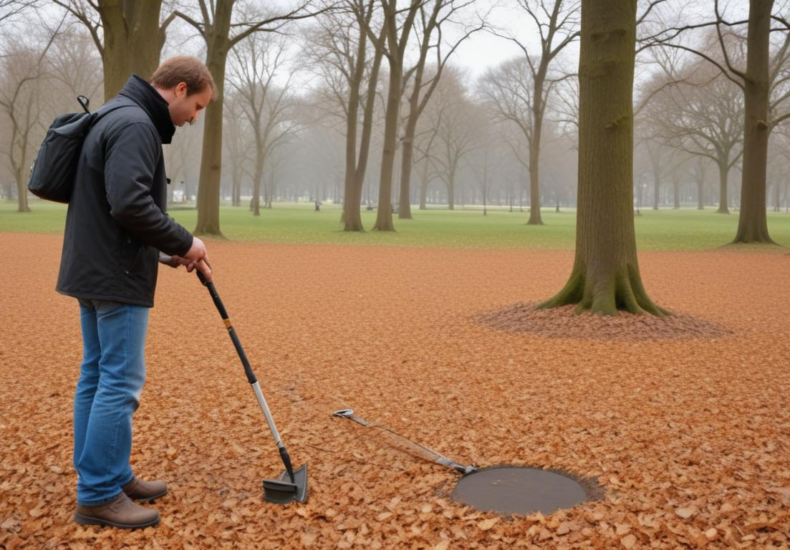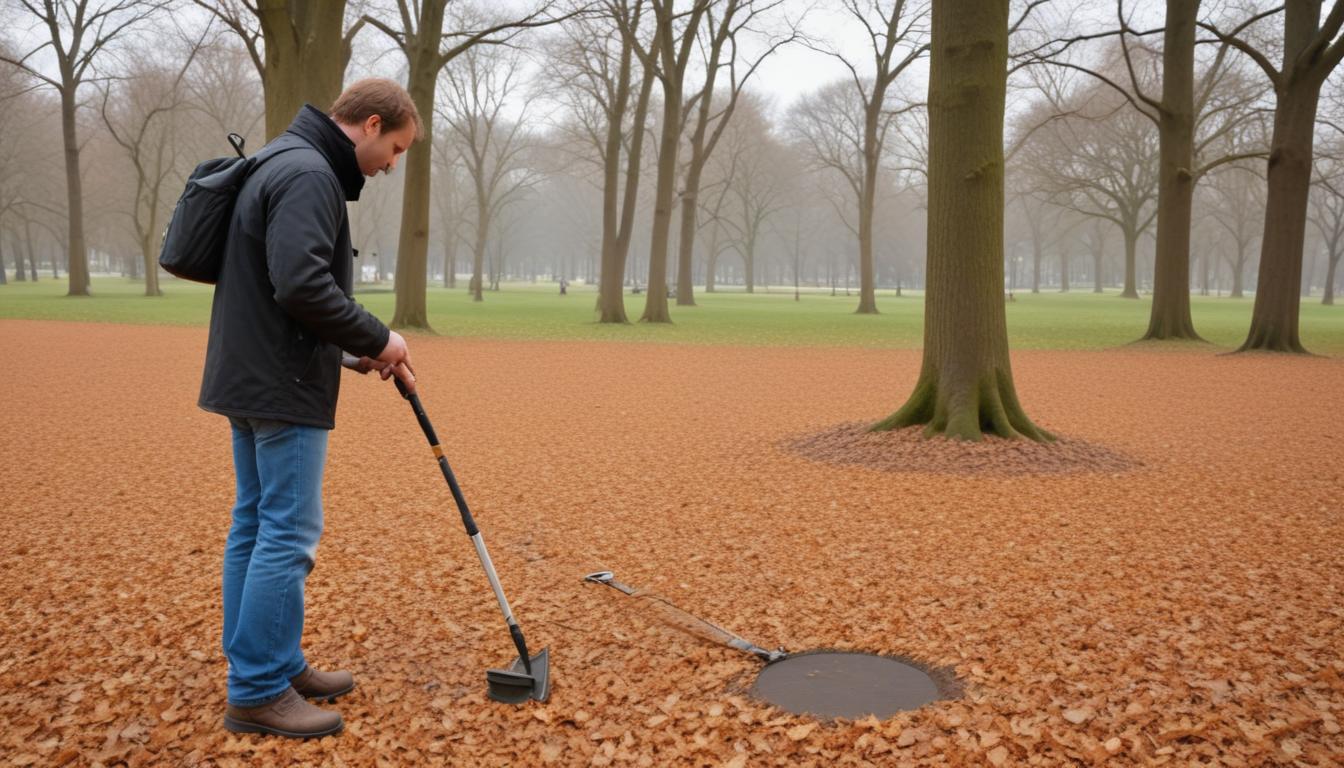
Metal detecting in parks: dos and don’ts
Before heading out with your metal detector, it’s crucial to understand and adhere to local regulations concerning metal detecting in parks. Many parks have specific rules that govern whether and where you can use metal detectors. These regulations vary significantly from one location to another, so it’s essential to obtain accurate information directly from local sources like park offices or municipal websites.
In some areas, metal detecting is allowed but with certain restrictions. For instance, you might be permitted to use metal detectors in designated areas only, or during certain times of the year to minimize the impact on wildlife and park visitors. Additionally, digging might be allowed only with tools that cause minimal disruption to the soil and its ecosystem. In other jurisdictions, metal detecting might be completely prohibited in parks.
It’s also important to familiarize yourself with any reporting requirements. Some localities require hobbyists to report their finds, particularly if they appear to be historically significant. This aspect of metal detecting etiquette ensures that valuable historical artifacts are preserved and studied rather than being kept as personal finds.
To avoid potential legal issues and to ensure a respectful practice of your hobby, always check for updates in local regulations before visiting a new park. Adherence to these rules not only protects park resources but also ensures that metal detecting enthusiasts can continue to enjoy this activity in a responsible and sustainable way.
Selecting the right equipment
Selecting the right equipment is essential for anyone interested in metal detecting in parks. The type of metal detector you choose can greatly influence your experience and the kind of objects you’re likely to find. For beginners, entry-level metal detectors with basic features are often sufficient. These detectors are usually less sensitive and easier to manage, making them ideal for learning the ropes of metal detecting without becoming overwhelmed.
More experienced hobbyists might opt for advanced detectors that feature multiple search modes, enhanced mineral rejection capabilities, and deeper detection ranges. These features can be particularly useful in parks where various minerals in the soil may interfere with detection accuracy. Additionally, choosing a detector with a pinpointing function can drastically reduce the time spent locating an object and decrease the disruption to the soil.
Besides the detector itself, selecting appropriate digging tools adheres to both the rules and etiquette of metal detecting in parks. Tools should be small and precise, like a hand trowel or a digging knife specifically designed for metal detecting. Large shovels are discouraged as they can cause significant disruption and damage to park grounds. It’s also prudent to carry a finds pouch or container where you can safely store any items you uncover, ensuring that small finds aren’t lost and the park remains litter-free.
Moreover, some metal detecting enthusiasts recommend the use of headphones to avoid disturbing other park visitors. Headphones can help you hear the subtler signals from your detector without the ambient noise of the park environment, which means not only improved detections but also maintaining a courteous distance from those enjoying the park’s natural tranquility.
Selecting the right equipment for metal detecting in parks is about balancing technology with responsibility. By choosing the appropriate tools and understanding how best to use them, you ensure a more successful and ethical metal detecting experience.
Respecting the environment
When indulging in the hobby of metal detecting in parks, it is essential to show respect for the natural environment. The thrill of discovering hidden treasures should never come at the expense of the park’s ecological health. As enthusiasts of this activity, it is our responsibility to ensure that our exploration impacts the natural habitat minimally.
One primary consideration is the method of digging. Enthusiasts should use tools that minimize damage to the ground, such as narrow trowels or screwdrivers, which allow for smaller, more precise excavation points. When digging, it’s imperative to carefully replace any soil and turf that has been disturbed, ensuring it looks as untouched as possible. This practice not only helps to preserve the natural landscape but also prevents animals and insects from being displaced from their natural habitats.
Another aspect of respecting the environment involves adhering to the ‘Leave No Trace’ principles which are widely recognized in outdoor activities. This includes packing out all litter, not just the finds from metal detecting but also any trash you might encounter in the park. Metal detecting parks operate under the assumption that visitors will maintain the cleanliness and integrity of the environment, preserving its beauty and usability for others.
Additionally, promoters of metal detecting etiquette advocate for seasonal sensitivity when planning expeditions. For example, avoiding metal detecting during nesting or breeding seasons can prevent disruptions to wildlife. This type of awareness and consideration is crucial for the protection of biodiversity in parks.
By respecting these guidelines and demonstrating a commitment to environmental conservation, metal detectorists ensure that parks remain welcoming and safe for all species that depend on them. The adherence to such rules not only enhances the image of the metal detecting community but also aligns with broader environmental goals of preserving our natural surroundings for future generations.
Etiquette towards other park visitors

While engaging in metal detecting in parks, maintaining proper etiquette towards other park visitors is crucial for fostering a harmonious environment. This involves a few fundamental behaviors that ensure both your experience and the experiences of others remain positive. Being considerate of others around you can make the difference between a pleasant day out and a disruptive one, which could lead to stricter rules and decreased access to these communal spaces.
Firstly, avoid intrusive noises that may disturb the peace and tranquility of the park setting. Use headphones when listening to the signals from your metal detector, so only you can hear the beeps and chirps. This simple practice not only helps you focus better but also respects other visitors’ right to enjoy the natural quiet or their own activities without interference.
Second, be mindful of your spatial presence. Metal detecting often requires moving in patterns and may involve digging. Always stay aware of your surroundings to ensure you’re not encroaching on picnic areas, playing fields, and other spaces that are being used by families and groups. Respecting others’ personal space, and ensuring that your activity doesn’t encroach or dominate communal areas, should be a priority.
Another important aspect of etiquette involves approaching the act of digging with discretion and care. Dig small, neat holes and always fill them back in after you’re finished, leaving no trace of your activity. Such practices are not only part of good metal detecting etiquette but are also crucial in maintaining the condition and aesthetic of the park grounds. This respects both the environment and other visitors who might use the same space for activities like walking or playing.
Engaging kindly and politely with curious onlookers or other park visitors who ask about your activity can also promote a positive image of metal detecting enthusiasts. Sharing knowledge about your hobby and demonstrating how you follow the park rules and etiquette to preserve the site can encourage understanding and acceptance from the non-detecting public.
Practicing good etiquette while metal detecting in parks ensures that the activity remains enjoyable and sustainable for everyone involved. It helps metal detectorists to be seen as responsible and considerate hobbyists, fostering better relationships with park authorities and other community members. By being mindful of noise, space, and your impact on the environment and others, you contribute to a positive atmosphere that enhances everyone’s enjoyment of these shared spaces.
Reporting your finds
For metal detecting enthusiasts, reporting your finds is not only a matter of etiquette towards the park and its history but also a legal requirement in many cases. Depending on the local rules, you may be required to report items that are potentially of historical significance to authorities. This is particularly true if you come across artifacts that could be deemed as archaeological or cultural heritage.
When you discover something that appears old or out of the ordinary, it’s advisable to contact the local park office or the relevant historical society to verify what steps need to be taken. Often, these bodies will have specific guidelines on how to handle such discoveries to ensure their preservation and proper study. For example, they may request a detailed location of where the item was found, descriptions, and photographs. This information can be crucial for archaeological teams, as it might contribute to broader historical research and understanding of the area.
In some regions, failure to report significant finds can result in legal penalties, including fines or confiscation of the discovered items. This underscores the importance of understanding and adhering to the rules established by metal detecting parks. These measures are put in place not to curtail the thrill of discovery but to balance it with the responsibilities we share in preserving cultural heritage.
Fostering an attitude of community and respect towards historical resources can greatly benefit the metal detecting community. By diligently reporting significant finds, detectorists not only comply with legal requirements but also help enhance the body of historical knowledge related to the parks and surrounding areas. Ethical reporting practices demonstrate a commitment to conservation and can lead to more favorable perceptions of metal detecting as a hobby.
Moreover, reporting your finds also plays a critical role in maintaining the integrity and trust within the metal detecting community. Cultivating strong relationships with park authorities and historical societies can lead to a better understanding of the hobby and potentially more areas being opened for exploration. Being seen as a responsible and cooperative group can pave the way for future opportunities and continued enjoyment of this engaging pastime.
While it may sometimes be tempting to keep a unique or valuable find, remembering the broader implications of such actions is crucial. The rules and etiquette surrounding metal detecting are designed not just to protect archaeological and cultural sites but also to ensure that history is accessible to everyone. By participating in responsible reporting, you contribute to the preservation and enrichment of our collective history.
You may also like
Archives
Calendar
| M | T | W | T | F | S | S |
|---|---|---|---|---|---|---|
| 1 | 2 | |||||
| 3 | 4 | 5 | 6 | 7 | 8 | 9 |
| 10 | 11 | 12 | 13 | 14 | 15 | 16 |
| 17 | 18 | 19 | 20 | 21 | 22 | 23 |
| 24 | 25 | 26 | 27 | 28 | 29 | 30 |
Leave a Reply